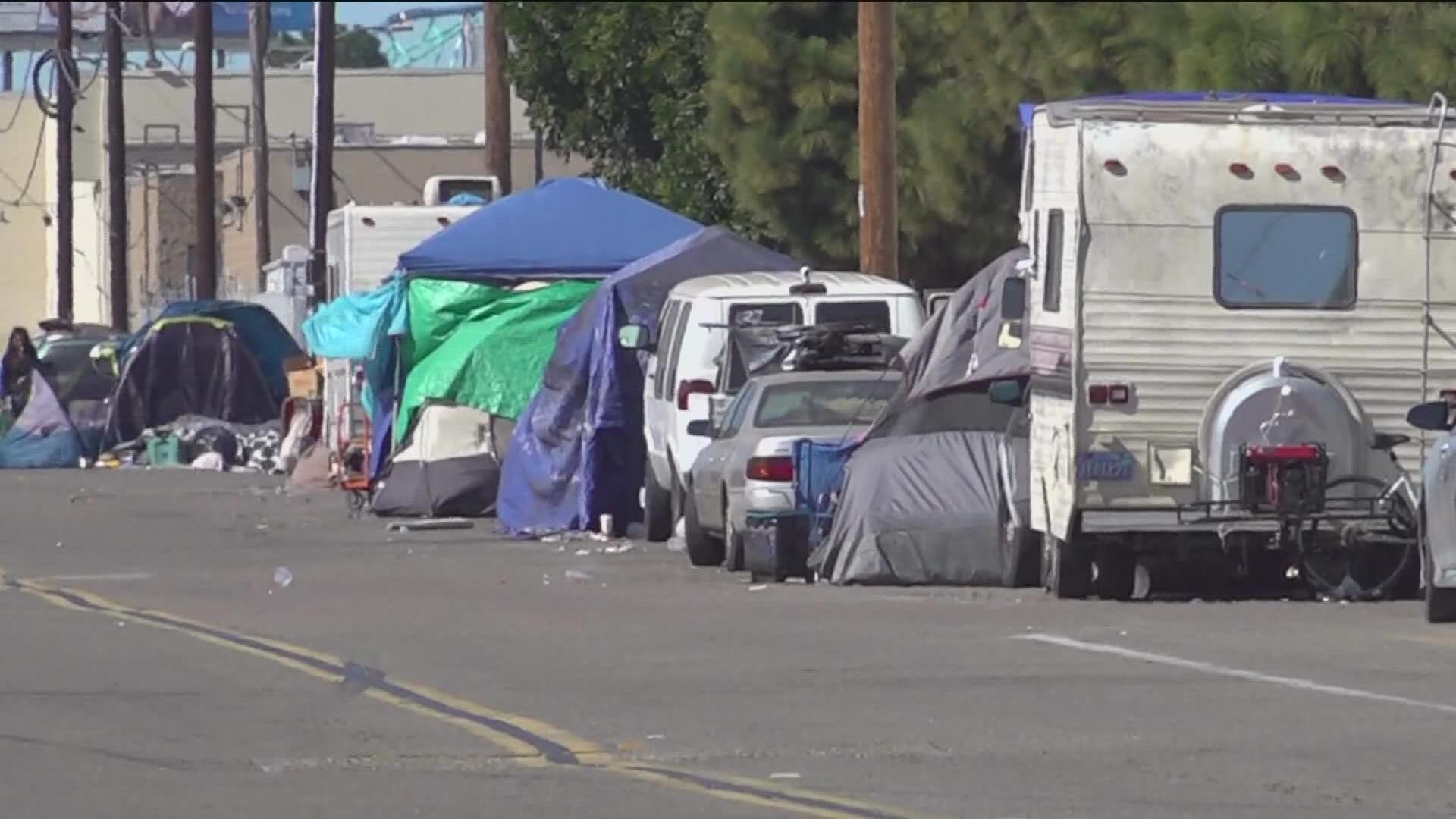SAN DIEGO — "I keep being told the problem is better than ever. It's not better than it's ever been — it's worse than it's ever been."
That is how Dan Shea from the Lucky Duck Foundation, a non-profit dedicated to fighting homelessness, described San Diego's homelessness crisis during a press conference in Balboa Park Wednesday morning.
"Everyone in politics and management says our hands are tied, but no one can explain why," Shea said.
For 2023, the foundation proposes a new approach that can get up to 500 people off the streets.
Their proposal — build two sprung structures at Inspiration Point in Balboa Park. These structures, also called "bridge shelters," are large tent-like buildings that can be quickly assembled and accommodate about 250 people.
"Bridge shelters can go up within months for pennies on the dollars and seconds on the hour compared to housing," said Drew Moser, executive director of the Lucky Duck Foundation. "We can all agree that housing is an ideal outcome, but if that's all we focus on, that's like telling passengers on a sinking ship, 'hang tight — we'll build you some lifeboats in the next two to 20 years.'"
Then, the foundation proposes paying these people to help clean up Balboa Park — expanding their "Cash for Trash" program.
This program offers $2 for every bag of trash collected. Participants picked up more than 44 tons of trash during a four-month period.
While co-founders of the Lucky Duck Foundation say they will also match all donations totaling up to $1.5 million each year, they acknowledge they need more help.
"We don't have the government's money," Shea said. "A lot of money coming from the state...coming to the city... it's time to spend it appropriately."
On Tuesday, Governor Gavin Newsom released his proposed budget for the upcoming year.
Even though the state is facing a $22.5 billion budget deficit, Governor Newsom emphasized that the homeless crisis is his primary focus. New data shows California has about 30% of the nation's homeless population.
Governor Newsom's budget proposal allocates $3.4 billion for homelessness, $400 million for cleaning up tent encampments, and $1 billion will go toward efforts to reduce the number of people living outdoors.
However, the governor has repeatedly said that local officials will not get this money until they submit bolder plans to fight homelessness.
The Lucky Duck Foundation says their prior work shows that their proposed solution can offer immediate help to those who want to get off the streets.
In September, the foundation opened the Rosecrans Shelter in the Midway District as a partnership between the county and the city. It can house 150 people and offers on-site mental health and drug treatment services.
"We're fully prepared to do more of those types of public-private partnerships," Moser said. "We're not here to be a critic; we're here to accelerate programs we believe will reduce homelessness."
For 2023, the Lucky Duck Foundation identified three priorities to focus on that will build long-lasting solutions for homelessness here in San Diego.
Reducing the criminal element within the homeless population
"We don't want to criminalize homelessness," Shea said.
While the charity noted there isn't a direct cause-and-effect relationship between homelessness and crime, they argue that as the homeless population grows, so does criminal activity among the homeless population.
They are calling on San Diego to adopt ordinances that law enforcement can effectively enforce and use to prosecute homeless individuals who also commit crimes.
Addressing youth homelessness
"As one youth social service provider says, 'We have to catch these kids while the cement is wet," Moser said.
The charity said about half of the chronically homeless population experienced it as a youth — one-quarter of homeless individuals first became homeless before the age of 25.
They added that many young people on the streets age out of the foster system and don't have another place to live.
If San Diego can identify and offer help to the most at-risk young people, then they can prevent these people from falling victim to systematic homelessness.
Helping homeless seniors
The Lucky Duck Foundation says homeless adults over 55 accounts for 25% of San Diego county's unsheltered population.
57% of them have a physical disability, which can be a big reason why they are without shelter.
The charity says the most common cause of homelessness among seniors is economic trouble because many live on fixed incomes and cannot keep up with the rising cost of living.
"Let's take people off the street that want to come off the street right now and are cooperative," Shea said. "There's just the starting point. In the meantime, we must work up plans for others."

